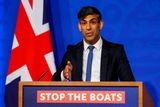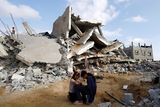Editorial: Out-of-control militarism cannot be allowed to prevail in the Middle East cauldron
US secretary of state Antony Blinken, who has made clear Washington does not seek any escalation in hostilities with Iran, but that it would continue to defend Israel. Photo: Getty
Tel Aviv is anxious to “send a message to Tehran” in response to Iran’s aerial assault. That was how Israel’s defence spokesman put it.
Sadly, that “message” is likely to be delivered in the form of a missile rather than a missive, affirming once again what a bloody and blunt instrument war is.
This “message” was in response to the one sent on Saturday night by the Iranians, which was in reply to the one sent to the Iranian consulate in Damascus at the beginning of the month.
If “retaliation” is all both sides have to offer, then the world must brace itself for more mass deaths, a probable recession, and a global fuel crisis, as energy prices go through the roof.
We must hope world peace is far too precious to be left at the mercy of the warmongers on either side, or a cabal of gung-ho generals.
Such instincts were summed up by the United States Army general, George S Patton, who said: “There is only one tactical principle which is not subject to change. It is to use the means at hand to inflict the maximum amount of wound, death, and destruction on the enemy in the minimum amount of time.”
But retaliation as a “means “ of restitution is utterly self-defeating.
It fans further flames of resentment. Inflicting suffering as a way of gaining satisfaction is equally destructive as it can only further fuel conflict.
The surest way to guarantee that Middle East violence spreads to multiple fronts is to allow the hawks have their way.
Solutions have to be found by non-violent non-military means. The US, China, Russia and Europe are all appealing for a de-escalation of the crisis.
Tel Aviv must listen to Washington. The US will not support a violent response.
Impressive though Israel’s Iron Dome defences are, were it not for US and Jordanian assistance, Iran’s irresponsible and reckless assaults would have led to considerable loss of life.
US secretary of state Antony Blinken has made it clear that Washington does not seek any escalation in hostilities with Iran, but that it would continue to defend Israel.
But either side would pay a heavy price were it to plunge the region into a wider war that would greatly threaten international security and safety.
Iran and Israel have been targeting each others’ interests across the Middle East for years.
Until now, Tehran was content with bankrolling and arming: Hamas in Gaza, Hezbollah in Lebanon and the Houthis in Yemen.
This direct attack marks a crossing of the Rubicon.
While there is time, it is vital to recognise that opening up another realm of limitless suffering can not be the answer.
The loss of innocent life in Gaza must serve as an indelible crimson deterrent as to what out-of-control militarism can unleash in this cauldron.
Join the Irish Independent WhatsApp channel
Stay up to date with all the latest news















